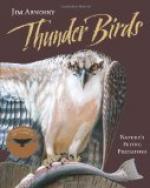“Uh course you’ll laugh—but you wasn’t laughing then. I’ll say you wasn’t. I thought you was croaked. Cost something to repair the plane, too. I’m saying it did. Had to have a new propeller, and a new crank-case for the motor—cost the old man at the ranch close to three hundred dollars before I turned her over to him, ready to take the air again. That’s including what he paid me, of course. But I guess you know what it cost, when he handed you the bill.”
This was news to Johnny, news that made his soul squirm. Lying there sick at the Rolling R ranch, he had not known what was taking place. He had found his airplane ready to fly, when he was at last able to walk out to the corrals, but no one seemed to know how much the repairing had cost. Certainly Sudden Selmer himself had suffered a lapse of memory on the subject. All the more reason then why Johnny should repay his debt.
“What I’m wondering about is why you aren’t in Los Angeles,” he evaded the unpleasant subject awkwardly. “Old Sudden gave you money to go, and dumped you at the depot, didn’t he? That’s what Mary V told me.”
“He did—and I missed my train. And while I was waiting for the next I must ‘a’ et something poison. I was awful sick. I guess it was ten days or so before I come to enough to know where I was. I’ve had hard luck, bo—I’ll say I have. I was robbed while I was sick, and only for a tambourine queen I got acquainted with, I guess I’d ‘a’ died. They’re treacherous as hell, though. Long as she thought I had money—oh, well, they’s no use expecting kindness in this world. Or gratitude. I’m always helpin’ folks out and gittin’ kicked and cussed for my pay. Lookit the way I lived with snakes and lizards—lived in a cave, like a coyote!—to help you git this plane in shape. You was to take me to Los for pay—but I ain’t there yet. I’m stuck here, sick and hungry—I ain’t et a mouthful since last night, and then I only had a dish of sour beans that damn’ Mex. hussy handed out to me through a window! Me, Bland Halliday, a flyer that has made his hundreds doing exhibition work; that has had his picture on the front page of big city papers, and folks followin’ him down the street just to get a look at him! Me—why, a yellow dawg has got the edge on me for luck! I might better be dead—” His loose lips quivered. Tears of self-pity welled up into his pale blue eyes. He turned away and stared across the barren calf lot that Johnny used for a flying field.
Johnny began to have premonitory qualms of a sympathy which he knew was undeserved. Bland Halliday had got a square deal—more than a square deal; for Sudden, Johnny knew, had paid him generously for repairing the plane while Johnny was sick. Bland had undoubtedly squandered the money in one long debauch, and there was no doubt in Johnny’s mind of Bland’s reason for missing his train. He was a bum by nature and he would double-cross his own mother, Johnny firmly believed. Yet, there was Johnny’s boyish sympathy that never failed sundry stray dogs and cats that came in his way. It impelled him now to befriend Bland Halliday.




